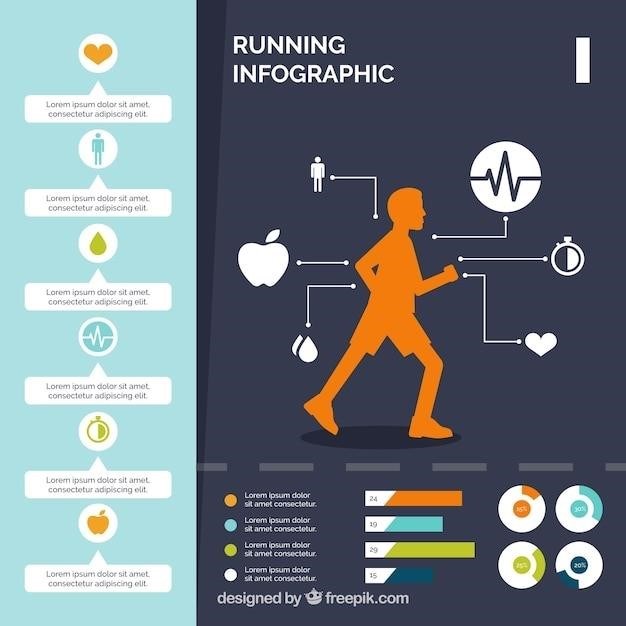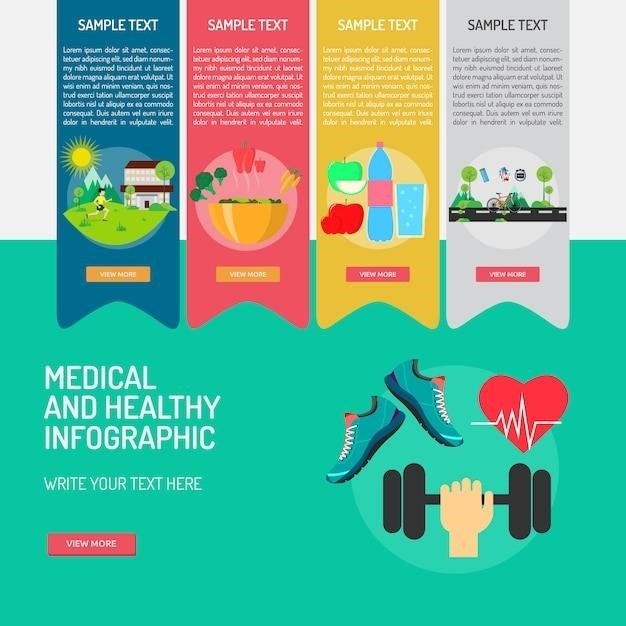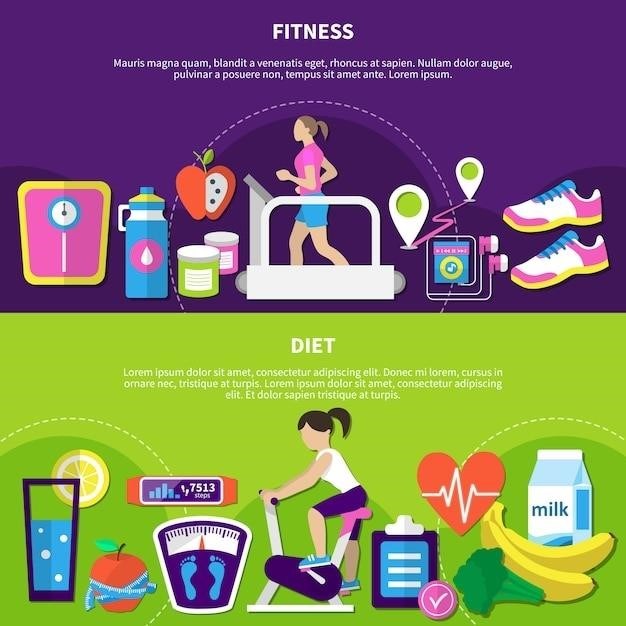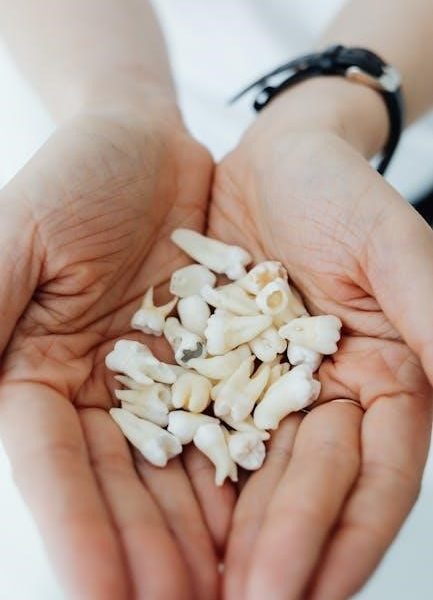
Marathon Training Nutrition⁚ A Comprehensive Guide
Discover a comprehensive guide to fueling your marathon training․ Learn optimal nutrition strategies for pre-run‚ during-run‚ and post-run recovery‚ maximizing performance and preventing exhaustion․ Downloadable PDF plans are available for easy reference․
The Importance of Nutrition in Marathon Training
Optimal nutrition is paramount for successful marathon training․ It’s not merely about consuming enough calories; it’s about the strategic intake of macronutrients (carbohydrates‚ proteins‚ and fats) and micronutrients (vitamins and minerals) to fuel intense training‚ promote muscle recovery‚ and prevent injury․ A well-structured nutrition plan ensures your body has the necessary resources to adapt to the demands of prolonged running․ Neglecting nutrition can lead to fatigue‚ decreased performance‚ weakened immunity‚ and increased susceptibility to illness․ A balanced diet provides sustained energy throughout training sessions and aids in the efficient repair of muscle tissue after workouts․ Prioritizing nutrition is an investment in your overall health and athletic performance‚ significantly contributing to the successful completion of your marathon training journey․ Remember‚ fueling your body correctly is as crucial as the miles you run․
Fueling Your Training⁚ Macronutrient Balance
Maintaining a balanced intake of macronutrients—carbohydrates‚ proteins‚ and fats—is crucial for successful marathon training․ Carbohydrates provide the primary fuel source for endurance activities‚ replenishing glycogen stores depleted during runs․ Prioritize complex carbohydrates like whole grains‚ fruits‚ and vegetables for sustained energy release‚ avoiding simple sugars that lead to energy crashes․ Protein is essential for muscle repair and growth‚ crucial for recovery after intense training․ Include lean protein sources like poultry‚ fish‚ beans‚ and lentils in your diet․ Healthy fats support hormone production and overall bodily functions․ Incorporate sources like avocados‚ nuts‚ seeds‚ and olive oil․ The ideal macronutrient ratio varies depending on individual needs and training intensity‚ but a general guideline is to prioritize carbohydrates‚ followed by protein and then healthy fats․ Consult a nutritionist or dietitian to determine a personalized macronutrient balance tailored to your specific training plan and body composition․ Remember‚ consistency is key to achieving optimal results․
Pre-Run‚ During-Run‚ and Post-Run Nutrition Strategies
Pre-run nutrition focuses on easily digestible carbohydrates for immediate energy without causing digestive upset․ A small portion of complex carbohydrates‚ like a banana or toast with a little nut butter‚ 1-3 hours before your run‚ is ideal․ During long runs (over 90 minutes)‚ consuming easily digestible carbohydrates every 45-60 minutes is crucial to maintain energy levels․ Consider energy gels‚ chews‚ or sports drinks with electrolytes․ Post-run nutrition prioritizes replenishing glycogen stores and repairing muscle tissue․ Consuming a mix of carbohydrates and protein within 30-60 minutes post-run is essential․ This could be a smoothie with fruit‚ protein powder‚ and yogurt‚ or a sandwich with whole-wheat bread and lean protein․ Hydration is vital throughout the entire process․ Drink plenty of water before‚ during‚ and after your runs to prevent dehydration․ Electrolytes are also important‚ especially during longer runs․ Experiment to find what works best for your body‚ considering factors like intensity‚ duration‚ and individual tolerance;
Sample Marathon Training Meal Plans
Access sample marathon training meal plans‚ including breakfast‚ lunch‚ dinner‚ and snack options․ These plans provide balanced nutrition for optimal performance and recovery․ Downloadable PDF versions are available for convenient use․
Breakfast‚ Lunch‚ and Dinner Options
Our sample marathon training meal plans offer a variety of options for breakfast‚ lunch‚ and dinner‚ ensuring you receive the necessary nutrients to fuel your runs․ Breakfast might include oatmeal with berries and nuts‚ providing sustained energy release․ Lunch could feature a whole-wheat sandwich with lean protein and vegetables‚ or a large salad with grilled chicken or fish․ Dinner options might include lean protein sources like chicken or fish‚ paired with whole grains such as quinoa or brown rice‚ and plenty of vegetables․ These meal plans are designed to provide a balance of carbohydrates‚ proteins‚ and healthy fats‚ crucial for endurance training and recovery․ Remember to adjust portion sizes based on your individual caloric needs and training intensity․ Hydration is equally important; drink plenty of water throughout the day․ The downloadable PDF provides detailed examples and recipes to guide your meal planning․
Snacking Strategies for Sustained Energy
Strategic snacking is vital during marathon training to maintain energy levels and prevent crashes between meals․ Our downloadable PDF provides a detailed guide to effective snacking․ Choose snacks that offer a balanced mix of carbohydrates and protein for sustained energy release․ Good options include fruits (bananas‚ apples)‚ yogurt‚ trail mix (nuts‚ seeds‚ dried fruit)‚ energy bars (check labels for added sugars)‚ and hard-boiled eggs․ Timing is key; consume snacks approximately 1-2 hours before and after your runs․ The size and frequency of snacks should be adjusted based on your individual needs and training intensity․ Avoid sugary snacks that lead to energy spikes and crashes․ Focus on nutrient-dense options that provide sustained energy and support muscle recovery․ The PDF includes sample snack schedules and recipe ideas for convenient and healthy options․
Hydration and Electrolyte Balance
Maintaining proper hydration and electrolyte balance is crucial for optimal marathon training performance․ Dehydration can significantly impact energy levels‚ endurance‚ and overall well-being․ Our downloadable PDF provides detailed guidance on hydration strategies tailored to your training schedule and intensity․ Drink water consistently throughout the day‚ increasing intake before‚ during‚ and after runs․ For longer runs (over an hour)‚ consider electrolyte drinks to replenish sodium‚ potassium‚ and other essential minerals lost through sweat․ Monitor your urine color; pale yellow indicates adequate hydration‚ while dark yellow suggests you need to increase fluid intake․ The PDF includes sample hydration schedules and recommendations for electrolyte supplementation‚ factoring in individual sweat rates and training duration․ Remember‚ proper hydration is essential for preventing muscle cramps and fatigue‚ maximizing performance‚ and supporting overall health during your marathon training journey․

Advanced Nutrition Considerations
Explore advanced nutrition strategies for marathon training․ Our PDF delves into dietary supplements‚ weight management during training‚ and the benefits of consulting a registered dietitian for personalized guidance․
Dietary Supplements and Their Role
While a balanced diet forms the cornerstone of successful marathon training‚ dietary supplements can play a supporting role․ However‚ it’s crucial to approach supplementation strategically and not as a replacement for whole foods․ Some runners might benefit from additional electrolytes to combat losses during intense training‚ particularly in hot and humid conditions․ Creatine‚ known for its muscle-building properties‚ might aid in high-intensity training sessions‚ but its impact on endurance running is debated․ Protein supplements can aid muscle recovery‚ particularly after long runs‚ though whole protein sources from foods are usually sufficient․ Iron deficiency is relatively common among female endurance athletes and supplementation might be necessary if blood tests reveal a deficiency․ Always consult with a doctor or registered dietitian before incorporating any supplements into your training regimen․ They can assess your individual needs and advise you on the appropriate dosages and potential interactions with medications․ Remember‚ the foundation of successful marathon training remains a well-planned‚ balanced diet rich in whole‚ unprocessed foods․
Addressing Weight Management During Training
Maintaining a healthy weight during marathon training requires a nuanced approach․ Significant weight loss can hinder performance by depleting energy stores and impacting recovery․ Conversely‚ excessive weight gain can strain joints and reduce efficiency․ The goal is to maintain a stable weight that supports optimal energy levels and endurance․ Focus on consuming a balanced diet rich in complex carbohydrates‚ lean proteins‚ and healthy fats‚ providing sustained energy throughout your training․ Avoid drastic calorie restriction‚ which can lead to fatigue and decreased performance․ Instead‚ prioritize nutrient-dense foods and adjust your caloric intake based on your training volume and intensity․ Regular monitoring of your weight and body composition‚ perhaps with the guidance of a healthcare professional‚ can help you fine-tune your nutrition plan․ Remember‚ consistency is key—small‚ sustainable changes are more effective than extreme diets for long-term weight management during your marathon training journey․ Consult a registered dietitian for personalized advice․
Consulting a Registered Dietitian
For runners‚ especially those training for a marathon‚ seeking professional nutritional guidance is invaluable․ A registered dietitian (RD) or registered dietitian nutritionist (RDN) possesses the expertise to create a personalized nutrition plan tailored to your individual needs‚ training schedule‚ and goals․ They can assess your current dietary habits‚ identify areas for improvement‚ and help you develop a sustainable eating pattern that supports optimal performance and recovery․ An RD can help you determine the appropriate caloric intake‚ macronutrient balance (carbohydrates‚ proteins‚ and fats)‚ and micronutrient needs to fuel your intense training regime․ They can also address any specific dietary concerns or restrictions you may have and provide practical strategies for managing weight fluctuations‚ hydration‚ and electrolyte balance․ Furthermore‚ an RD can offer valuable insights into the role of dietary supplements‚ ensuring you make informed choices and avoid unnecessary or potentially harmful products․ Investing in professional guidance from a registered dietitian can significantly enhance your marathon training experience and contribute to achieving your best possible results․ This personalized approach leads to safer and more efficient training․


